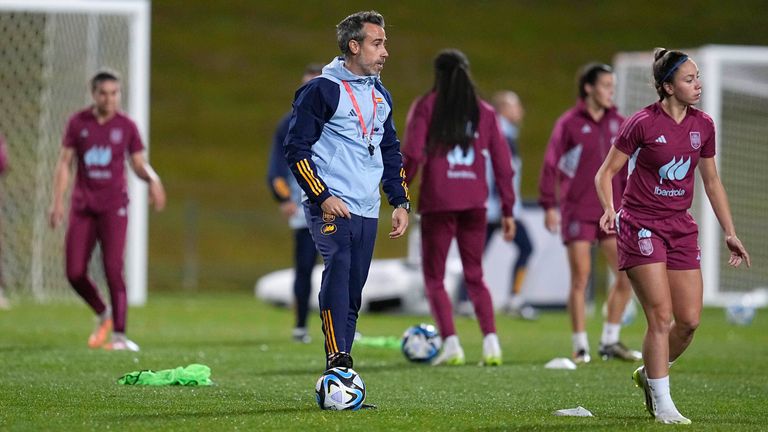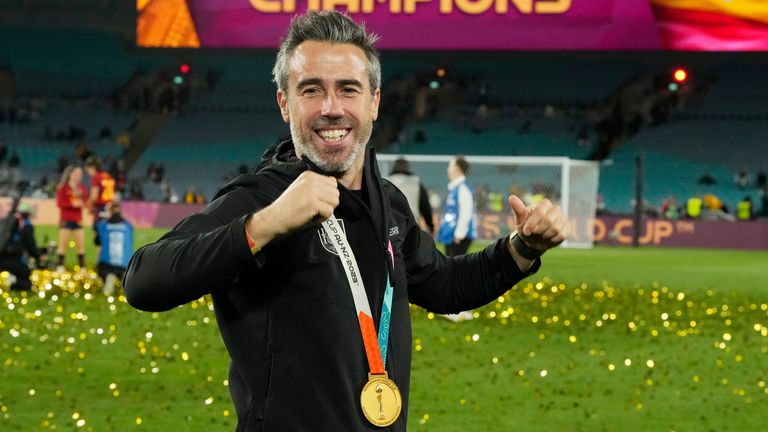Jorge Vilda sacked by Spain Women: Controversial coach leaves post amid RFEF president Luis Rubiales fallout
Jorge Vilda sacked by Spain Women: Controversial coach leaves post amid RFEF president Luis Rubiales fallout Sky Sports


Women’s World Cup-winning coach Jorge Vilda sacked by Spanish FA
The Spanish Football Association (FA) has dismissed Jorge Vilda, the coach who led the women’s national team to victory in the Women’s World Cup. Vilda’s dismissal comes in the midst of a controversy surrounding the FA president, Luis Rubiales.
Vilda guided Spain to a 1-0 win over England in the final of the Women’s World Cup on August 20. However, his association with the suspended Rubiales has led to his removal from the position.
Montse Tome appointed as Vilda’s successor
Montse Tome has been named as Vilda’s immediate successor by the RFEF, making her the first woman to be appointed as Spain’s head coach. Tome had been serving as Vilda’s assistant since 2018 and has played a crucial role in the growth of the national team, according to the RFEF.

Stand-in Spanish FA president Pedro Rocha has promised a restructure of the RFEF in an open letter, where the governing body apologized for the “enormous damage” caused by Rubiales’ actions. The RFEF later confirmed Vilda’s removal in a statement.
- “The RFEF, in one of the first renewal measures announced by president Pedro Rocha, has decided to dispense with the services of Jorge Vilda as sports director and women’s national coach,” it read.
- “We value his impeccable personal and sporting conduct, being a key piece in the notable growth of women’s football in Spain. During his extensive period, Vilda has been a promoter of the values of respect and sportsmanship in football.”
All 11 of Vilda’s backroom colleagues had already resigned in protest over the ongoing crisis surrounding Rubiales. Rubiales was pictured kissing Spain forward Jenni Hermoso on the lips during on-field celebrations in Sydney. Vilda himself faced criticism for applauding Rubiales’ comments during a subsequent press conference, where Rubiales refused to resign and criticized “fake feminists”.

Rubiales publicly praised Vilda as the best coach in women’s football during his speech and assured him of a new €500,000-a-year, four-year contract. However, Vilda later released a statement criticizing Rubiales without explicitly calling for his resignation or dismissal.
Vilda has faced controversy throughout his tenure as Spain’s head coach. Last year, 15 players wrote a letter to the RFEF threatening to boycott the team if Vilda was not sacked. Their grievances included the management of injuries, the atmosphere in the locker room, team selection, and training sessions.
Analysis: Untenable position for Vilda and Spanish national side
Sky Sports News chief reporter Kaveh Solhekol commented on the situation:
“We were expecting this to happen last Thursday. Pedro Rocha, the president of the RFEF went to the south of France for the Champions League draw. He wanted to deal with this as quickly as possible because Spain’s women’s team has a Nations League game coming up.
“You had the totally ridiculous and untenable situation where the whole squad and even more players, something like 83 players, had signed a letter saying they were not going to play for Jorge Vilda or Luis Rubiales.
“We also had his whole backroom team resign en masse. His position was totally untenable, without any players, or any backroom staff. How could he carry on being head coach of the world champions?
“I think the final thing that did it for him was those pictures of Luis Rubiales giving the speech at the extraordinary assembly, Vilda was filmed applauding what he had to say. I think when people saw that, a lot of the thought that was the end for him.
“He tried to backtrack a few days later, releasing a statement saying he didn’t agree with what Rubiales had done, but even then he stopped short of demanding he leave. But it’s no surprise he’s now lost his job.
“I know from the outside looking in, people might think it’s extraordinary that someone who’s just won the World Cup has lost his job, but there’s a lot more going on in the background, and a lot of players in the Spain team were unhappy with his management.
“Quite a lot wrote an open letter last year saying they weren’t going to play for him any more, but Rubiales backed him instead of them. Now the head coach has lost his job, and we know Rubiales as well is finished.”
The rise and fall of Vilda: A timeline
- July 2015: Succeeds Ignacio Quereda as Spain head coach after he is sacked for poor performance during 2015 Women’s World Cup.
- September 2018: Finishes eighth at FIFA Best Awards for best women’s coach after overseeing Spain’s qualification for their second-ever World Cup, while also leading U19s to Euros victory.
- June 2019: Achieves qualification from World Cup group for the first time in Spain’s history but is beaten by winners USA in the last 16.
- September 2022: Fifteen Spain players write a letter criticizing RFEF and calling for Vilda’s dismissal after a poor Euro 2022 performance, and refuse to represent the country while he remains in post. RFEF president Luis Rubiales publicly backs the manager and threatens mutinous players with a five-year ban from selection.
- May 2023: Three of those 15 players are named in Vilda’s World Cup squad – Aitana Bonmati, Mariona Caldentey
SDGs, Targets, and Indicators Analysis
1. Which SDGs are addressed or connected to the issues highlighted in the article?
- SDG 5: Gender Equality
- SDG 10: Reduced Inequalities
The article discusses the dismissal of the coach of the Spanish women’s national football team due to a controversy surrounding the president of the Spanish Football Association (RFEF). This issue is connected to SDG 5, which focuses on achieving gender equality and empowering all women and girls. The appointment of a female coach as the successor highlights efforts towards gender equality in leadership positions. Additionally, the article mentions the resignation of all 11 backroom colleagues of the coach, indicating potential inequalities or conflicts within the team.
The article also indirectly touches upon SDG 10, which aims to reduce inequalities within and among countries. The controversy surrounding the president’s actions and the subsequent resignation of team members suggest potential inequalities or conflicts within the RFEF.
2. What specific targets under those SDGs can be identified based on the article’s content?
- Target 5.1: End all forms of discrimination against all women and girls everywhere
- Target 10.2: By 2030, empower and promote the social, economic, and political inclusion of all, irrespective of age, sex, disability, race, ethnicity, origin, religion or economic or other status
The issues discussed in the article relate to discrimination against women and girls in leadership positions within the Spanish Football Association. The appointment of a female coach as a successor can be seen as an effort to address discrimination and promote gender equality (Target 5.1). The resignation of team members and the controversy surrounding the president’s actions also highlight potential inequalities and the need for social, economic, and political inclusion within the organization (Target 10.2).
3. Are there any indicators mentioned or implied in the article that can be used to measure progress towards the identified targets?
- Indicator 5.1.1: Whether or not legal frameworks are in place to promote, enforce, and monitor equality and non-discrimination on the basis of sex
- Indicator 10.2.1: Proportion of people living below 50 percent of median income, disaggregated by age, sex, and employment status
The article does not explicitly mention specific indicators. However, Indicator 5.1.1 can be relevant to measure progress towards ending discrimination against women and girls in leadership positions within the Spanish Football Association. It would assess whether legal frameworks are in place to promote, enforce, and monitor equality and non-discrimination based on sex.
Indicator 10.2.1 can be relevant to measure progress towards promoting social, economic, and political inclusion within the organization. It would assess the proportion of people, including women, living below 50 percent of median income, disaggregated by age, sex, and employment status.
Table: SDGs, Targets, and Indicators
SDGs Targets Indicators SDG 5: Gender Equality Target 5.1: End all forms of discrimination against all women and girls everywhere Indicator 5.1.1: Whether or not legal frameworks are in place to promote, enforce, and monitor equality and non-discrimination on the basis of sex SDG 10: Reduced Inequalities Target 10.2: By 2030, empower and promote the social, economic, and political inclusion of all, irrespective of age, sex, disability, race, ethnicity, origin, religion or economic or other status Indicator 10.2.1: Proportion of people living below 50 percent of median income, disaggregated by age, sex, and employment status Behold! This splendid article springs forth from the wellspring of knowledge, shaped by a wondrous proprietary AI technology that delved into a vast ocean of data, illuminating the path towards the Sustainable Development Goals. Remember that all rights are reserved by SDG Investors LLC, empowering us to champion progress together.
Source: skysports.com

Join us, as fellow seekers of change, on a transformative journey at https://sdgtalks.ai/welcome, where you can become a member and actively contribute to shaping a brighter future.







